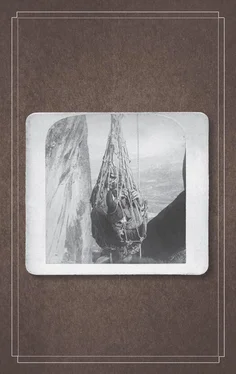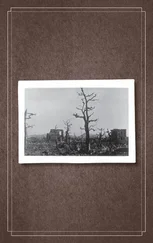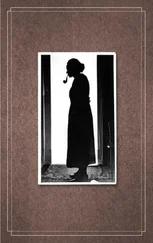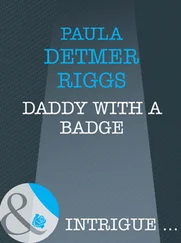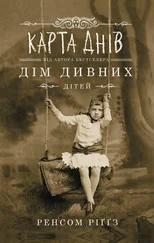And then the island was simply gone, swallowed up by a mountain of fog.
As if it had never existed.
* * *
Before long the fog caught up to us. By increments we were blinded, the mainland dimming and the sun fading to a pale white bloom, and we turned circles in the eddying tide until we’d lost all sense of direction. Finally we stopped and put our oars down and waited in the doldrummy quiet, hoping it would pass; there was no use going any farther until it did.
“I don’t like this,” Bronwyn said. “If we wait too long it’ll be night, and we’ll have worse things to reckon with than bad weather.”
Then, as if the weather had heard Bronwyn and decided to put us in our place, it turned really bad. A strong wind blew up, and within moments our world was transformed. The sea around us whipped into white-capped waves that slapped at our hulls and broke into our boats, sloshing cold water around our feet. Next came rain, hard as little bullets on our skin. Soon we were being tossed around like rubber toys in a bathtub.
“Turn into the waves!” Bronwyn shouted, slicing at the water with her oars. “If they broadside us we’ll flip for sure!” But most of us were too spent to row in calm water, let alone a boiling sea, and the rest were too scared even to reach for the oars, so instead we grabbed for the gunwales and held on for dear life.
A wall of water plowed straight toward us. We climbed the massive wave, our boats turning nearly vertical beneath us. Emma clung to me and I clung to the oarlock; behind us Hugh held on to the seat with his arms. We crested the wave like a roller coaster, my stomach dropping into my legs, and as we raced down the far side, everything in our boat that wasn’t nailed down—Emma’s map, Hugh’s bag, the red roller suitcase I’d lugged with me since Florida—went flying out over our heads and into the water.
There was no time to worry about what had been lost, because initially we couldn’t even see the other boats. When we’d resumed an even keel, we squinted into the maelstrom and screamed our friends’ names. There was a terrible moment of silence before we heard voices call back to us, and Enoch’s boat appeared out of the mist, all four passengers aboard, waving their arms at us.
“Are you all right?” I shouted.
“Over there!” they called back. “Look over there!”
I saw that they weren’t waving hello, but directing our attention to something in the water, some thirty yards away—the hull of an overturned boat.
“That’s Bronwyn and Olive’s boat!” Emma said.
It was upside down, its rusty bottom to the sky. There was no sign of either girl around it.
“We have to get closer!” Hugh shouted, and forgetting our exhaustion we grabbed the oars and paddled toward it, calling their names into the wind.
We rowed through a tide of clothes ejected from split-open suitcases, every swirling dress we passed resembling a drowning girl. My heart hammered in my chest, and though I was soaked and shivering I hardly felt the cold. We met Enoch’s boat at the overturned hull of Bronwyn’s and searched the water together.
“Where are they?” Horace moaned. “Oh, if we’ve lost them …”
“Underneath!” Emma said, pointing at the hull. “Maybe they’re trapped underneath it!”
I pulled one of my oars from its lock and banged it against the overturned hull. “If you’re in there, swim out!” I shouted. “We’ll rescue you!”
For a terrible moment there was no response, and I could feel any hope of recovering them slipping away. But then, from the underside of the overturned boat, there was a knock in reply—and then a fist smashed through the hull, wood chips flying, and we all jumped in surprise.
“It’s Bronwyn!” Emma cried. “They’re alive!”
With a few more strikes Bronwyn was able to knock a person-sized hole in the hull. I extended my oar to her and she grabbed it, and with Hugh and Emma and me all pulling, we managed to drag her through the churning water and into our boat just as hers sank, vanishing beneath the waves. She was panicked, hysterical, shouting with breath she didn’t have to spare. Shouting for Olive, who hadn’t been under the hull with her. She was still missing.
“Olive—got to get Olive,” Bronwyn sputtered once she’d tumbled into the boat. She was shivering, coughing up seawater. She stood up in the pitching boat and pointed into the storm. “There!” she cried. “See it?”
I shielded my eyes from the stinging rain and looked, but all I could see were waves and fog. “I don’t see anything!”
“She’s there!” Bronwyn insisted. “The rope!”
Then I saw what she was pointing at: not a flailing girl in the water but a fat thread of woven hemp trailing up from it, barely visible in all the chaos. A strand of taut brown rope extended up from the water and disappeared into the fog. Olive must’ve been attached to the other end, unseen.
We paddled to the rope and Bronwyn reeled it down, and after a minute Olive appeared from the fog above our heads, one end of the rope knotted around her waist. Her shoes had fallen off when her boat flipped, but Bronwyn had already tied Olive to the anchor line, the other end of which was resting on the seafloor. If not for that, she surely would’ve been lost in the clouds by now.
Olive threw her arms around Bronwyn’s neck and crowed, “You saved me, you saved me!”
They embraced. The sight of them put a lump in my throat.
“We ain’t out of danger yet,” said Bronwyn. “We still got to reach shore before nightfall, or our troubles have only just begun.”
* * *
The storm had weakened some and the sea’s violent chop died down, but the idea of rowing another stroke, even in a perfectly calm sea, was unimaginable now. We hadn’t made it even halfway to the mainland and already I was hopelessly exhausted. My hands throbbed. My arms felt heavy as tree trunks. Not only that, but the endless diagonal rocking of the boat was having an undeniable effect on my stomach—and judging from the greenish color of the faces around me, I wasn’t alone.
“We’ll rest awhile,” Emma said, trying to sound encouraging. “We’ll rest and bail out the boats until the fog clears …”
“Fog like this has a mind of its own,” said Enoch. “It can go days without breaking. It’ll be dark in a few hours, and then we’ll have to hope we can last until morning without the wights finding us. We’ll be utterly defenseless.”
“And without water,” said Hugh.
“Or food,” added Millard.
Olive raised both hands in the air and said, “ I know where it is!”
“Where what is?” said Emma.
“Land. I saw it when I was up at the end of that rope.” Olive had risen above the fog, she explained, and briefly caught a clear view of the mainland.
“Fat lot of good that does,” grumbled Enoch. “We’ve circled back on ourselves a half-dozen times since you were dangling up there.”
“Then let me up again.”
“Are you certain?” Emma asked her. “It’s dangerous. What if a wind catches you, or the rope snaps?”
Olive’s face went steely. “Reel me up,” she repeated.
“When she gets like this, there’s no arguing,” said Emma. “Fetch the rope, Bronwyn.”
“You’re the bravest little girl I ever knew,” Bronwyn said, then set to working. She pulled the anchor out of the water and up into our boat, and with the extra length of rope it gave us we lashed together our two remaining boats so they couldn’t be separated again, then reeled Olive back up through the fog and into the sky.
There was an odd quiet moment when we were all staring at a rope in the clouds, heads thrown back—waiting for a sign from heaven.
Читать дальше
